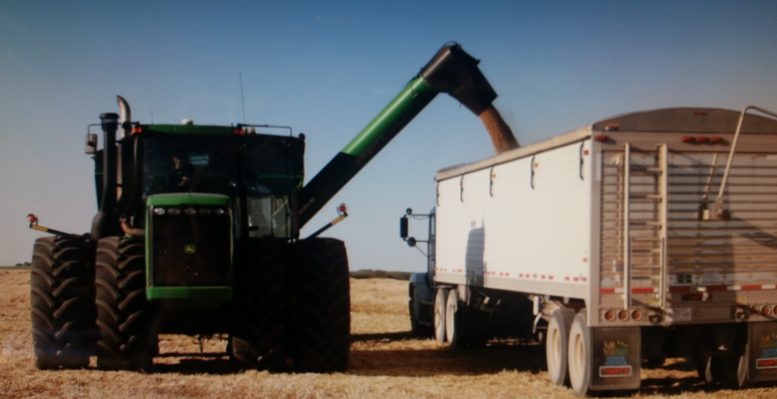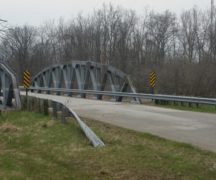By JAN LARSON McLAUGHLIN
BG Independent News
As the weather warms and farmers start itching to get out in their fields, the Wood County Commissioners want to make one point perfectly clear – there will be no blanket fee for farm equipment on county roads.
During discussions about an overweight truck program for the county, an initial annual blanket fee of $100 per vehicles was considered.
However, the commissioners quickly nixed those plans, and removed any blanket fee for farm equipment from the overweight permit plan.
While the word about the initial farm fee proposal spread like weeds in a soybean field, the word about the fee removal seems to have missed some people, Wood County Administrator Andrew Kalmar said Thursday.
In fact, the rumors worsened, with some farmers now believing they will have to pay $100 each time their vehicles travel county roads.
The commissioners have heard that many farmers plan to show up to protest the non-existent fees at the next town meeting held by the commissioners on Monday at 5:45 p.m., in the Center Township Building.
The goal of the Overweight Vehicle Permit program is to protect county roads and bridges from damage. Overweight vehicles that travel state routes are required to obtain a permit from the Ohio Department of Transportation. These same overweight vehicles travel state routes legally, then exit onto county and township roads with no permits or regard for the capacity of the roads or bridges.
The only permit fee that could affect farmers is for vehicles that exceed 87,000 pounds – most likely semi-trucks hauling grain.
“This is to protect our assets,” Wood County Engineer John Musteric said of the overweight permit program recently during a meeting with the county commissioners. “We’re spending a lot of money to improve these roads and bridges.”
While many of the proposed county fees mirror amounts charged by the Ohio Department of Transportation for overweight traffic, the initial farm fees do not.
The commissioners agreed that the blanket farm fees be discarded.
“You don’t want to be the farm police,” Wood County Administrator Andrew Kalmar said during that meeting.
Grand Rapids area farmer Dan Potter said there would not be a meeting room big enough for all the unhappy farmers if the county enacted blanket fees. He explained that ODOT exempts all farm equipment driving down the road from overweight fees.
No farm equipment weighs more than the maximum allowable weight of 80,000 pounds, Potter said
However, some semi-loads of grain may be overweight. But there is no way for farmers to determine the weight of the loads prior to them being weighed at the grain elevator.
“We know that coming out of the field it’s impossible to tell,” said Shane Johnson, of the county engineer’s office.
Commissioner Craig LaHote suggested that the new overweight load program information be given to local grain elevators, so they can inform the farmers who bring in heavy loads.
The goal of the program is to redirect heavy traffic away from roads and bridges that are not able to handle the loads.
“This is really nothing new,” Musteric said. “All we’re trying to do is protect our assets. We know people are overloaded and they’re going across our load-limited bridges. We’re concerned, and the commissioners should be, too. It’s your assets.”
No permits will be required of traffic that is less than 80,000 pounds. But even traffic under the limit should be cautious about crossing some of the bridges in the county, Musteric said. Some have load limits far under 80,000 pounds, like one on Bays Road that has a 10,000 pound limit.
When permits are issued, the truck owners will have to identify their routes, and may be asked to change their routes to more appropriate roads.
The program will also allow the Wood County Sheriff’s Office to use portable scales from ODOT to weight loads suspected of being overweight.
“We’re going to use those to try to educate people,” Musteric said. The sheriff’s “ultimate goal is to not write any tickets.”
Musteric stressed, “This is not a money grab.”
The permit fees and fines will be used for road and bridge maintenance, Musteric said.





